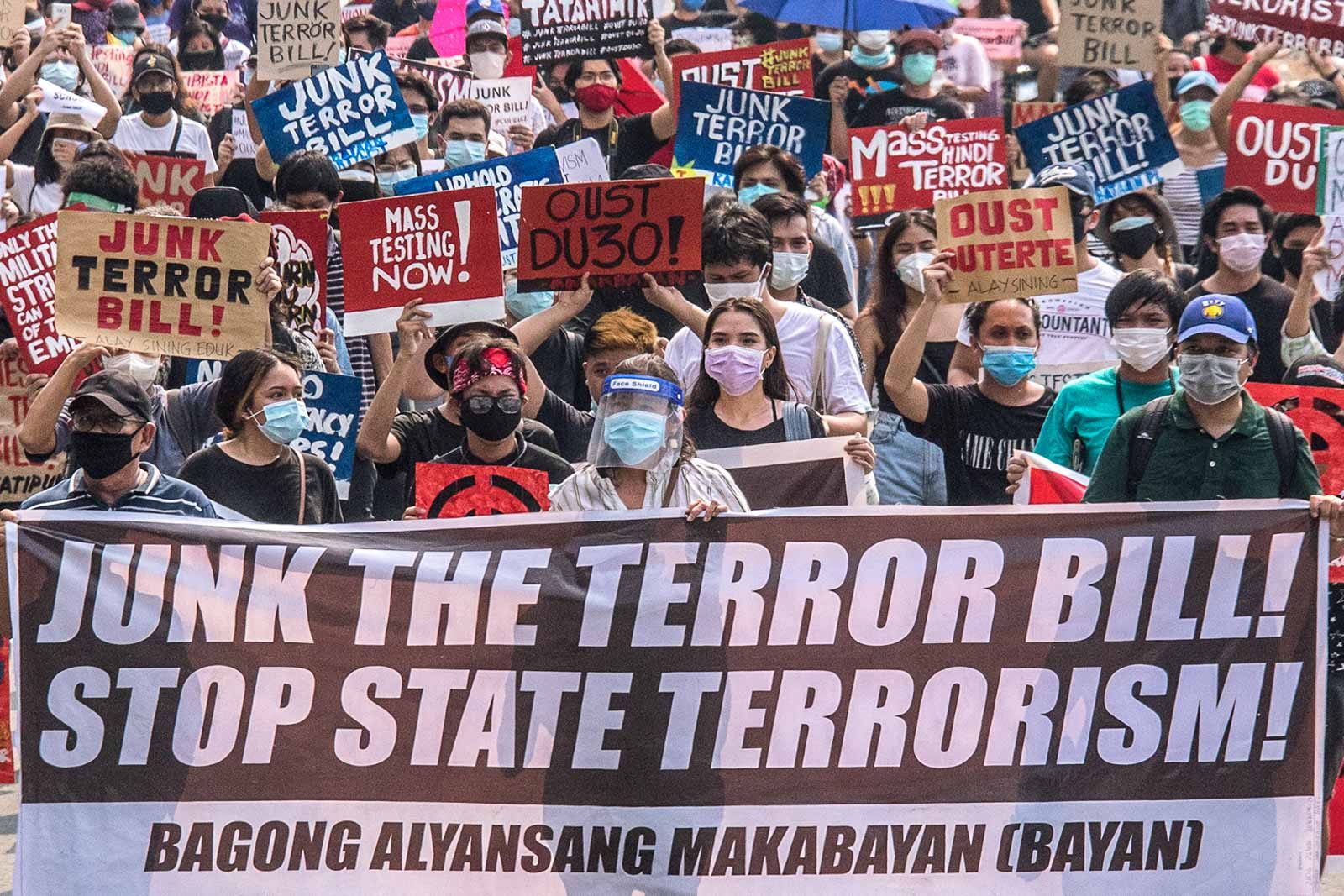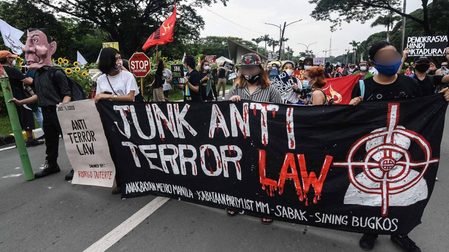SUMMARY
This is AI generated summarization, which may have errors. For context, always refer to the full article.

MANILA, Philippines – The Supreme Court (SC) has released procedural rules on handling petitions and applications on the controversial Anti-Terrorism Act (ATA) of 2020 and related laws. The rules take effect on January 15.
The rules, released years after the law was implemented, cover petitions and applications concerning detentions without judicial warrants of arrest, surveillance orders, freeze orders, restrictions on travel, designations, proscriptions, and other court issuances connected to the implementation of the anti-terror law.
But aside from clarifying how the law will be implemented by the authorities, the new rules also provided some remedies for the people who will be affected by the law.
Lawyer Kristina Conti, secretary general of the National Union of Peoples Lawyers – National Capital Region (NUPL-NCR), distinguished remedies from safeguards. She explained that remedies are options one can invoke after something has already been done, while safeguards prevent abuses from happening in the first place.
Designation
Section 25 of the contested law defines the designation of individuals, groups of persons, organizations, or associations.
The anti-terror council (ATC), based on the law, holds the arbitrary power to designate who will be considered terrorists. This was considered dangerous by many activists, who challenged the law, because the ATC can designate anyone without going to trial.
The council can order the designation even just basing it on their own determination, and even without asking the side of the designee. Another mode of designation is the automatic designation of individuals and groups, which are already part of the UN Security Council’s list. In 2021, the High Court already voided the option where the ATC can designate upon the request by other nations.
Now, under the new rules, the SC allows a remedy after designation. Rule 2, Section 1 of the SC rules allows a person to file a petition for certiorari – used to review grave abuse of discretion – to challenge the designation. Conti said that the petition for certiorari will be based on gross misapprehension of facts and misinterpretation of the law.
The NUPL lawyer explained that the implementing rules and regulations (IRR) of the law issued by the Department of Justice (DOJ) “only elaborated on delisting, based on mistaken identity, change of circumstances, and the like.” The DOJ’s IRR allows designated terrorists to delist themselves or remove themselves from the terror list by following a process set by the rules.
Proscription
Aside from designation, the authorities can also tag a person or group a terrorist through proscription. In this method, a trial would be needed to include an individual or group in the list of terrorists. Unlike designation, proscription is not arbitrary because a person can only be declared a terrorist through proscription after a full trial conducted by the judiciary.
When the contention of the anti-terror law reached the High Court, former chief justice Reynato Puno said proscription “may not be the favored method by the executive authorities considering they have to hurdle the checking power of the judiciary.” Puno served as one of the amici curiae (friends of the court) or individuals selected by the court to share their expertise that helped in the decision.
Associate Justice Alfredo Benjamin Caguioa, during the oral arguments, also questioned anti-terror council’s broad powers, noting that “designation already achieves the purpose of proscription.”
Conti said the new SC rules required “quantum of proof, clear, and convincing evidence” for the proscription. Section 12 of the new High Court rules states that on the matter of issuing a preliminary and permanent order of proscription, the burden to establish that there is enough evidence against a respondent lies on the petitioner.
The new SC rules also provide options to review the proscription order – either to modify or lift it. Conti explained the DOJ’s IRR is limited. It only “specified only itself as a party, supported by ATC and NICA (National Intelligence Coordinating Agency), which may file for a re-issuance of a proscription order.”
More clarifications
Under the new guidelines, the SC also provided a safeguard on surveillance. Rule 4 states that no law enforcement agent “may secretly wiretap, overhear and listen to, intercept, screen, read, surveil, record, or collect, with the use of any mode, form, kind, or type of electronic, mechanical or other equipment or device or technology,” without a written order from the judiciary, particularly the Court of Appeals.
The surveillance order only applies to the following, based on the SC rules:
- “Between members of a judicially-proscribed terrorist organization, as provided in Section 26 of the ATA”
- “Between members of a designated person as defined in Section 3(e)of Republic Act No. 10168” (The Terrorism Financing Prevention and Suppression Act of 2012)
- “Any person charged with, or suspected of, committing any of the crimes defined and penalized under the provisions of the ATA”
The rules also require that there should be probable cause or strong evidence before the surveillance order will be released.
In addition, the SC also clarified what due regard should be given to vulnerable persons. Section 51 of the anti-terror law states that there should be due regard “for welfare of the elderly, pregnant, persons with disability, women, and children.”
The High Court rules stated that if an arrestee belongs to this sector, he/ she should be “detained in a facility that is separate and more appropriate to his/her condition,” among others.

Conti said the special rules “fill in a lot of gaps in the implementation of laws,” such as the recognition of the vulnerable persons and on the required process for surveillance. However, the new rules do “not cure the fundamental flaws of the laws” they have continually raised, the NUPL lawyer added.
“But while the rules try to address errors, overreach, and abuses in the implementation continuously observed in dismissed terror cases we have handled, it cannot assure that these will not happen in the first place,” Conti added.
She also reminded that the law enforcement should comply with the rules once they take effect on January 15, or they could be held in contempt. – with reports from Lance Spencer Yu/ Rappler.com
Add a comment
How does this make you feel?








There are no comments yet. Add your comment to start the conversation.